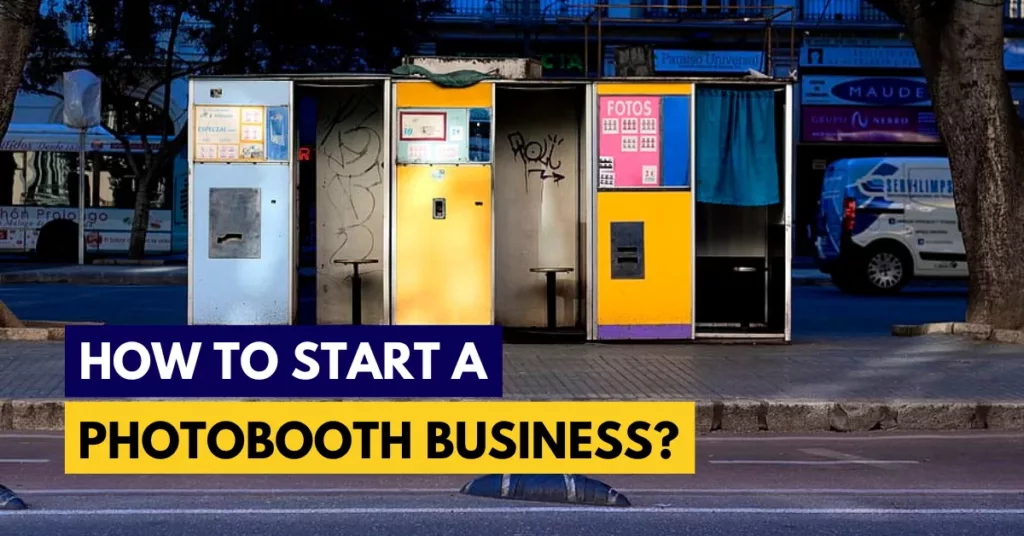The temptation of a photo booth is hard to resist in a world where every moment has the potential to become a memory. It’s that particular spot at a gathering where jokes are freely told, funny expressions are captured in priceless photos, and nostalgia is nurtured.
You’re about to embark on an exciting path that combines entrepreneurship, innovation, and creativity if you’ve ever been intrigued by the thought of establishing your own photobooth business.
How to start a photobooth business? The following sections will examine the art and science of launching a photo booth company. You’ll learn tips and tricks to survive and succeed in this fascinating sector, from choosing the proper equipment to dazzling your clients with inventiveness from navigating the legal system to promoting your brand.
Establishing a Photo Booth Business
Starting a photobooth business may be lucrative but requires proper preparation and execution. Here is a detailed, step-by-step manual to get you started:
Step 1: Market Investigation And Business Planning
- Choose a specialty within the photo booth business and your target market. Think of celebrations like weddings, business parties, birthdays, and charity gatherings.
- Do some local competition research. Understand competitors’ pricing, services, and consumer feedback to find market gaps.
- Describe your company’s objectives, target market, pricing, marketing, and projected financials. You can follow a well-thought-out company strategy as a guide.
Step 2: Setup of the Law and Business
- Choose your company structure, such as a corporation, LLC, or sole proprietorship.
- Register your company name with the relevant government departments. Obtain any licenses and permissions that are required for your site.
- Invest in liability insurance to safeguard your company from harm during events or incidents.
- You must get an Employer Identification Number (EIN) from the IRS to employ people.
Step 3: Setup and Equipment
- Select a top-notch camera, backdrop, lighting setup, tablet or computer for picture editing, and a printer. Purchase an easy-to-use, dependable photo booth system.
- Purchase a range of props, outfits, and accessories to improve the visitors’ photo booth experience.
- Consider providing personalization choices like themed backdrops, green screen technologies, GIFs, and filters to attract additional customers.
Step 4: Services and Pricing
- Establish your pricing strategy. Think about things like the length of the event, the number of prints, customization, and extras like picture albums or digital downloads.
- Make several service bundles to accommodate a variety of customer demands and budgets. Provide special rates for large reservations or recurring clients.
Step 5: Branding and Marketing
- Make a business website with your services, portfolio, costs, and contact details. Make it search engine optimized (SEO).
- Attend wedding fairs, business gatherings, and networking functions to meet event coordinators and possible customers.
- Invest in internet advertising through channels like Google Ads and Facebook Ads to reach a larger audience.
Step 6: Contracts and Reservations
- Create a system for managing customer requests and reservations quickly. Be ready to give prices and respond to inquiries.
- Make detailed contracts that specify the work’s scope, cost, payment conditions, cancellation procedures, and other crucial information. For legal protection, seek legal advice.
Step 7: Event Planning
- Set up your photo booth and test equipment before arriving at events to ensure everything goes as planned.
- If necessary, hire staff to run the photo booth during events, help visitors, and fix technological problems.
Step 8: Customer Feedback and Experience
- Excellent customer service is required. During events, be kind, considerate, and aware of the visitors’ requirements.
- Clients should be encouraged to offer feedback following their events. Utilize this input to enhance your offerings and marketing testimonials.
Step 9: Growing Your Company
- Consider extending your offerings to include more photography, photobooths, or event organizing.
- To increase your clientele, fund more considerable marketing efforts and consider forming alliances with venues and event planners.
Step 10: Growth and Financial Management
- To manage your finances, use accounting software or work with a certified public accountant.
- Reinvest earnings to expand services, buy new equipment, or hire more people to support business expansion.
A photobooth startup needs commitment, imagination, and top-notch customer service. Following this step-by-step manual and consistently enhancing your offerings will help you build a profitable photobooth business that improves the fun and memories of many events.
Criteria for Licencing When Opening a Photo Booth Company
The licensing requirements for launching a photo booth company might change depending on where you are, so it’s crucial to learn about and adhere to the local laws. However, the following is a thorough summary of the usual licensing and allowing considerations:
1. Business Permit
You will often require an operating permit or general business license. The local or county government is where you may get this licensee. It enables you to run your photo booth company in a particular region legally.
Contact your neighborhood city hall or county clerk’s office to learn more about the application procedure, costs, and specifications for acquiring a business license.
2. Permit for Sales Tax
You’ll need a sales tax permit or license if your state or municipality charges a sales tax on products and services. This enables you to charge clients for sales tax on taxable transactions and collect it from them.
3. Permit for Home Occupation
You could require a home occupancy permission or a home-based business permit if you intend to operate your photo booth company from your house. Contact your local zoning department or planning commission to determine if you need this permission and what limitations could be in place. Zoning laws and home occupation rules differ depending on where you live.
4. Permits for Special Events or Vendors
You could require special event or vendor permissions to operate at specific locations, fairs, festivals, or open spaces, depending on the events you cater to. Vendors are frequently required to have these permissions in place by event organizers. Before these events, work with the event planners to secure the necessary permissions.
5. Permits From The Health Department
In some circumstances, you may require health department permissions or licenses if you provide extra services like food and beverage concessions as part of your photo booth setup to guarantee compliance with food safety rules. Inspections and adherence to specific health and safety standards may be required for these permits.
6. Licencing Of Music
You could require permission from music performance rights organizations (PROs) like ASCAP, BMI, or SESAC to play copyrighted music at events using your photo booth. You can utilize piece that is protected by copyright with these licenses. Issues with copyright infringement may arise if the appropriate permits are not obtained.
7. Insurance Regulations
Although a photobooth business does not require a typical license, it is essential to have sufficient insurance coverage. In the event of mishaps, injuries, or property damage during events, liability insurance is necessary to safeguard your company. Consider insurance protection for your assets and equipment as well.
8. Intellectual Property and Trademarks
Ensure your company name, logo, and branding elements do not conflict with any already-registered trademarks. If required, register your trademarks to safeguard your intellectual property.
9. Local Laws and Regulations
Look into local laws or rules related to photo booth companies. Regulations governing commercial signs, noise legislation, and event-specific limitations are a few examples.
10. Registering and Reporting Your Business
Register your firm with state authorities and submit yearly reports, depending on your region and business structure. To learn your business type’s criteria, speak with the state department responsible for business registration.
Always speak with local government organizations, licensing authorities, and legal counsel to guarantee complete compliance with all relevant licensing and permitting regulations. Legal repercussions, penalties, or suspending your company’s operations may result from failing to get the required licenses and permissions.
What are Some Occasions When Photo Booth Rentals are Common?
Rental photo booths are adaptable and famous at a variety of events. Here are several well-known occasions where photo booth rentals and information on their suitability are frequently required.
1. Weddings
One of the most common events for photo booth rentals is weddings. During the celebration, couples and visitors adore capturing unguarded and unforgettable moments. Photobooths provide the newlyweds with amusing pictures from their wedding day while entertaining and providing visitors with mementos.
2. Corporate Activities
Photo booths are frequently used at business events, including conferences, seminars, trade exhibitions, and company parties, to foster networking and brand awareness. Customizable backgrounds and accessories can include business logos and branding components, giving attendees a distinctive and enjoyable experience.
3. Birthday Celebrations
For all ages, photo booths make birthday celebrations more exciting. Guests adore dressing up, taking pictures, and making lifelong memories on any occasion, whether it’s a child’s birthday, a milestone event like a 30th or 50th, or even a sweet sixteen.
4. Proms and Dances at Schools
Proms and other school dances are the best occasions to rent a photo booth. Students can take enjoyable, casual photos of their friends and dates. Backdrops that may be customized can fit the event’s theme or the school’s colors.
5. Holiday Gatherings
Halloween, Christmas, New Year’s, and other holiday events are excellent settings for photo booths. Visitors may take themed photographs using costumes, holiday-themed backdrops, and festive decorations.
6. Events for Charity and Fundraisers
At fundraising events, photo booths may engage visitors and foster a good time. When attendees have a good time at the event, they are more inclined to donate to the charity. Additionally, some companies sponsor picture booths at charitable events, improving their reputation.
7. A Bar or Bat Mitzvah
Photo booths are frequently used during these coming-of-age ceremonies to entertain attendees, particularly teens. Both younger and older people will find a photo booth an exciting pastime.
8. Parties for Graduates
Graduation celebrations are essential occasions, whether they are for high school or college graduates. The graduates and their guests may preserve the excitement and pride of the event by renting a photo booth.
9. Milestones
Anniversary milestones like the 25th or 50th wedding anniversary call for lavish parties. A highlight: photo booths let couples and their guests make priceless memories.
10. Expos and Trade Shows
At trade exhibitions and expos, companies frequently rent photo booths to draw attendees to their booths. These booths may have branded backgrounds and accessories to captivate potential consumers and offer a distinctive marketing opportunity.
11. Baby and Bridal Showers
These small-scale events are ideal for photobooths since they let visitors connect over amusing pictures. These events can benefit from having personalized backgrounds and accessories.
12. Promotional Activities
Businesses frequently employ photo booths during promotional events, store openings, and product launches to engage customers and raise brand recognition. For further visibility, post branded images and objects on social media.
13. Sports Competitions and Events
To document the excitement of players and spectators, sporting events and races sometimes include photo booths. Athletes, supporters, and runners can pose before or after the race.
For guests, photobooth business for sale may bring a particular entertaining layer to various events, making them more memorable and engaging. In this cutthroat industry, differentiating yourself by tailoring your photo booth offerings to each event’s unique requirements and themes might be helpful.
Last Words
How to start a photobooth business? Creating a photo booth firm offers a dynamic route to entrepreneurship in the digital age. This business has excellent potential for success because of the always-rising need for distinctive event experiences. A well-thought-out photobooth business may capture the spirit of celebration while creating a successful business by offering entertainment and enduring memories.
Frequently Asked Questions (FAQs)
Q: How to start a photobooth business with ideal software?
A: The solution is to compare several software packages, consider customization and social media integration, and read reviews from other photo booth owners.
Q: What kinds of events can I provide photo booth services for?
A: You can cater to various occasions, such as weddings, parties, business events, festivals, and fundraising efforts.
Q: Do photobooth businesses need insurance?A: Yes, insurance can safeguard your company’s assets and operations in mishaps or unanticipated catastrophes.
Which investment has the least liquidity?



